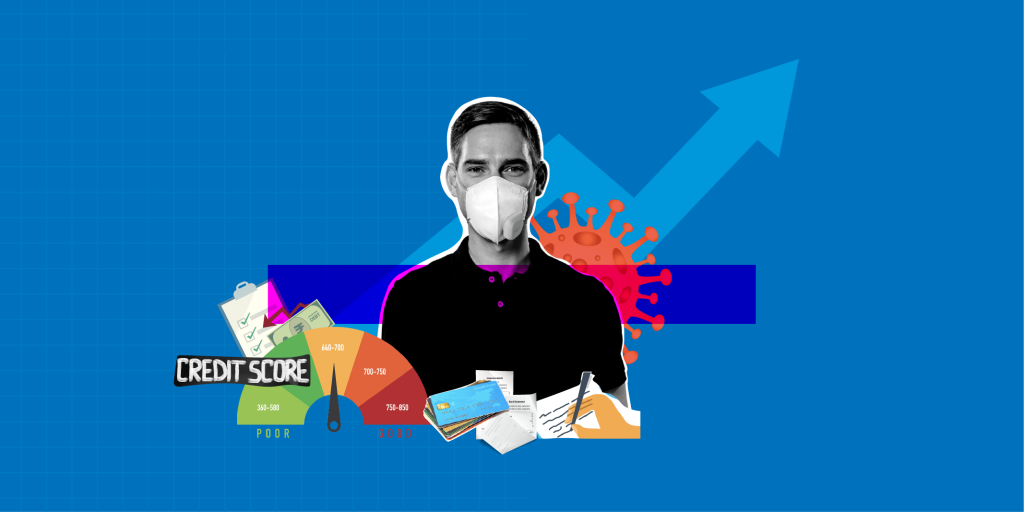Last Updated on Jun 16, 2020 by Aradhana Gotur
The importance of maintaining a good credit score at all times cannot be underestimated. After all, your credit score influences:
- The probability of your loan getting approved
- The rate of interest on your loan
- The amount of loan you can get
For those who don’t know what a credit score is: it is a numeric representation of your credit health. By credit health, we mean your financial ability to avail loans and repay them on time. In short, your creditworthiness. If you have a good credit score, you can get a loan and on favourable terms. If not, you may not get a loan or accept unfavourable terms such as high-interest rates and low sanction. That’s why, having a good credit score is vital for your credit health.
So, how to maintain a good credit score? By repaying your debts on time. But with the economy seemingly heading towards a recession, loss of jobs and pay cuts would be a common sight. That said, repaying debts may be a challenge, also some of us may be already be struggling with finances due to the COVID-induced lockdown. Is it possible to maintain a healthy credit score then? If yes, how? We answer that and more in this article.
This article covers:
How to maintain a good credit score during coronavirus (COVID-19)?
Table of Contents
What is a good credit score?
A credit score ranges from 300 to 900; the higher, the better. Specifically, 750 and above is considered a good credit score. Anything below is a bad or a low credit score, which hurts your creditworthiness.
How to maintain a good credit score during coronavirus (COVID-19)?
You ought to build and maintain a good credit score, even if you may not see a need to avail a loan immediately. This will go a long way and come in handy when you need a loan in the future. Also, if you need an emergency fund.
So here’s how you can maintain a good credit score during COVID-19.
1. Always keep an eye on your credit report
Simply put, a credit report is like a marks card that summarises your credit details and activities for a given period. These may be the types of credit, repayment history, and other information that the credit bureau (the entity that assigns you a credit score) reports to your potential lenders.
The lenders, in turn, review your credit report to understand your credit history and gauge your ability to repay the loan. If all looks fine, they approve your application. If not, they reject your loan. Ergo, you must report any and every discrepancy in your credit report to the bureau so such errors don’t impact your credit score and the chances of availing a loan easily.
2. Repay your debts as much as possible
It is a well-known fact that credit cards have some of the highest interest rates in the market. Meaning, your credit card debt is really expensive. Therefore, it makes sense to repay your credit card bills in full on time every month. This way, you can avoid hefty penal interest and keep your credit score from falling. Same goes for loans, especially the ones with a high-interest rate. However, if the current situation doesn’t allow you to repay the bill in full, repay as much as possible. This way you can:
· Maintain a good credit score
· Reserve money for other expenses
· Reduce or avoid late penalty
3. Consolidate your debts into a low-cost loan
If repaying multiple loans seems difficult to you during the pandemic, consider rolling them into a single loan. Scout for lenders offering a low-interest rate on loans and apply for one. This way, you can use the low-cost loan to repay all your debts at one go. In the end, you will be left with a single loan, meaning:
- You repayment burden and cost is reduced
- You can maintain your credit score
4. Avoid ATM cash withdrawals from a credit card
Credit card issuers charge interest on cash withdrawals. Meaning, every time you withdraw cash using your credit card, you attract high interest—a certain percentage of the amount withdrawn—and adds to your monthly credit card bill. While such interest doesn’t impact your credit score directly, it may end up impacting your credit score in case you fail to repay the bill.
5. Avoid applying for a loan or credit card unnecessarily
If your credit score is already low, avoid applying for new credit, be it a loan or a credit card. The logic here is simple—to make things easier for yourself. If you avail a new line of credit, you will have to accommodate it in your monthly budget. If you can’t afford to repay your debts, your already low credit score will further head south. However, if you have to avail an emergency loan, try to repay it on time.
6. Keep your old credit accounts open
Good credit behaviour contributes to a good credit score. In the past, you may have availed credit cards or loans and repaid the dues on time. This shows that you are an experienced borrower and may also be creditworthy. Closing such credit accounts associated with timely repayment and good history erases the good records and reduces your credit score. Therefore, it is wise to keep them open so your credit score is not impacted.
A broader tip to avoid the impact on your credit score during the pandemic is to avoid discretionary expenses so you don’t have to look for credit to meet them. Let us know how you are managing your debts below 🙂
Suggested reading: Coronavirus: how to cope with a salary cut?
- Best Performing Index Funds in India (2025) - Jun 5, 2025
- Issue of Shares – Meaning, Types, Examples and Steps - Jun 4, 2025
- Banking Mergers in India – List of Merged PSU Banks, Advantages, and Challenges - Jun 3, 2025





